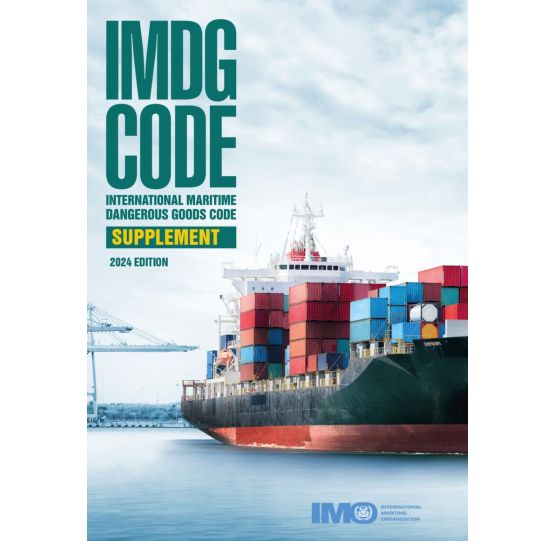IMDG Code Supplement, 2024 Edition
The International Maritime Dangerous Goods Code (IMDG Code) lays out the regulatory framework for all aspects of handling dangerous goods and marine pollutants in sea transport, but does not include all details of procedures for packing of dangerous goods or actions to take in the event of an emergency or accident involving personnel who handle goods at sea.
This Supplement presents the publications associated with the IMDG Code that cover these aspects of the transport of dangerous goods.
The 2024 edition of the Supplement features:
- The Revised Emergency Response Procedures for Ships Carrying Dangerous Goods (EmS Guide), taking into account Amendment 42-24 to the IMDG Code
- the Medical First Aid Guide for Use in Accidents involving Dangerous Goods (MFAG)
- the Reporting procedures
- the Recommendations on the safe use of pesticides in ships
- the International Code for the Safe Carriage of Packaged Irradiated Nuclear Fuel, Plutonium and High-Level Radioactive Wastes on board Ships (INF Code)
- other appropriate resolutions and circulars pertaining to the transport of dangerous goods, including Guidelines for the implementation of the inspection programmes for cargo transport units (MSC.1/Circ.1649) and the List of non-exhaustive voluntary guidance on pest contamination (MSC.1/Circ.1650).
The IMDG Code Supplement should be of interest to maritime administrations, shipping companies, manufacturers, packers, shippers, feeder services such as road and rail, and port authorities.
As a specialized agency of the United Nations, IMO is the global standard-setting authority for the safety, security and environmental performance of international shipping. Its main role is to create a regulatory framework for the shipping industry that is fair and effective, universally adopted and universally implemented.
In other words, its role is to create a level playing field so that ship operators cannot address their financial issues by simply cutting corners and compromising on safety, security and environmental performance. This approach also encourages innovation and efficiency.
Shipping is a truly international industry, and it can only operate effectively if the regulations and standards are themselves agreed, adopted and implemented on an international basis. IMO is the forum at which this process takes place.


